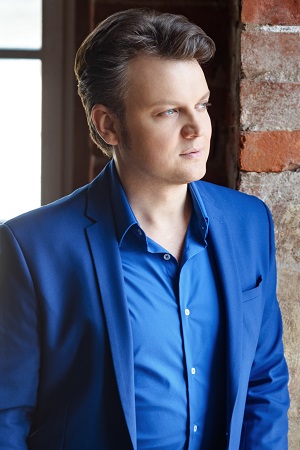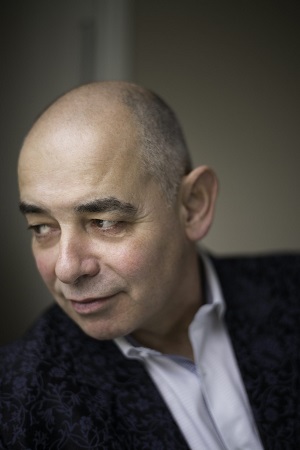This was the second concert in the Hall’s Russian Song Series which began in September. Curated by pianist Iain Burnside, the series is bringing repertoire by leading Russian composers from the mid-19th to the mid-20th centuries to the UK concert platform, allowing us an opportunity to hear infrequently performed songs by composers such as Myakovsky, Gretchaninov, Cui, Glazunov and Glière.
In a recent interview, Burnside identified some of the ‘themes’ which unite this rich repertoire and what he described as ‘the vocabulary of star gazing, breast beating and soul searching’ was certainly in evidence here. There is an operatic intensity and scale about many of these songs, as Burnside’s two musical partners – the Ukrainian tenor Dmytro Popov and Lithuanian mezzo-soprano Justina Gringytė – confirmed in performances of drama, vivid characterisation and colour.
Both singers have powerful voices and can unleash a full-throated intensity with ease. Popov’s lyric tenor is beautiful of tone, generally steady of intonation – there was just an occasional wavering from the centre of the note at phrase-end climaxes – and rises to the top without strain. Relaxed and singing with obvious enjoyment, he took great care with the Russian texts, bringing words and notes together with engaging focus and clarity, though perhaps not always capturing the tender simplicity and sincerity of some of the more folk-like songs.
Gringytė sings with a fervour and power which, in the intimate environs of Wigmore Hall, were at times somewhat overwhelming, but the vibrant energy which I noted when I saw the mezzo-soprano perform the role of Preziosilla in David Pountney’s WNO production of La forza del destino in March this year was equally impressive here. Gringyt?’s tone, particularly her chest voice, is marvellously rich and she used her unwaveringly secure technique to luxuriantly amplify the sound, communicating the emotional tortures and raptures expressed in some of these songs with a soul-engulfing intensity – although sometimes there was a shrillness as her mezzo rose and she reached ever deeper in the music’s wells of agony and suffering. The astonishing strength of her voice was, however, advantageous in controlling the softer phrases, the moments of vulnerability and gentleness, and like Popov, Gringytė was unfailingly attention to the texts.
Beside such drama and extroversion – and, at times, exaggeration – Iain Burnside himself adopted an assuming, supportive role. He was a quietly reassuring presence (the Steinway lid was only slightly raised), but, the piano accompaniments were ever sensitive to the singers’ needs and nuances, and Burnside’s thoughtful expressivity in the piano preludes and postludes defined wonderfully discrete environments from which he sung dramas could emerge.

Tchaikovsky wrote romances throughout his career, his hundred or so songs spanning from his early years as a student at the St Petersburg Conservatoire to the Op.73 set of 1893, the year of his death. In selecting his texts, he generally avoided the work of the great Russian poets, such as Pushkin or Lermontov, preferring to set poetry by writers such as Daniil Rathaus, Aleksey Konstantinovich Tolstoy, Ivan Zakharovich Surikov, whose lyrics we heard here, and he also had a penchant for the poems of the Grand Duke Konstantin Romanov. César Cui suggested that Tchaikovsky viewed poetry as a ‘necessary evil’ in the process of song composition, but his settings of Lev Alexandrovich Mey’s translations of Heine, which framed the sequenced presented here, seemed rather to demonstrate an instinctive, uncomplicated response to text which inspired directness of melodic expression. Popov sculpted a strong line in ‘Khotel by v jedinoje’ (I wishI could pour into a single word (the translations, from the Cyrillic and into English, were not credited)) and in ‘Otchevo?’ (Why?) built the short, questioning phrases to a powerful concluding climax, ‘Why, oh tell me right now, did you leave me and forget me?’. Popov sang three of the Op.73 settings of Rathaus, beginning ‘Mi sideli s toboy’ (We sat together) seated stage-left besides Gringytė. But, after Burnside’s unsettling bass line and wandering minor harmonies had delineated the storm which embodies, in its driving rain, the protagonist’s grief and tears, he moved to the centre – ‘once again, as before, I’m alone’ – his loneliness exacerbated by the cruelly growling piano bass. ‘Zakatilos solntse’ (The sun has set) was full of persuasive passion, the final phrase almost exploding with the lover’s boundless joy, while ‘Snova, kak prezhde, odin’ (Again, as before, alone), a song which is gently propelled the piano’s repeating rhythmic motif, came to a quieter, more poignant point of rest: ‘Say a prayer for me. I am praying for you.’ Popov combined an even middle-voice and controlled head-voice effectively in ‘Mochi bezumnye’ (Frenzied nights), capturing the oppositions of the protagonist’s recollections of love.
Gringytė’s dynamic and coloristic range were immediately apparent in ‘Uzh gasli v komnatakh’ (The lights were going out in the rooms), the drama of memories of ardent love being tempered by the piano’s poised repetitions creating an almost Chekhovian resignation. ‘Kaby znala ya’ (If only I had known) grew from the piano’s high, delicate tapestry-weave – with Gringytė seated, eyes cast downwards – to a quasi-hysterical expression of disillusioned love culminating in a terrible cry of pain, ‘If only I’d know, I’d realised’ that could not be assuaged by the return of the piano’s subtle sparkling. The latter now seemed hollow and haunting. This song is the first of seven which form Tchaikovsky’s Op.47 set, and Gringytė also presented the final song, ‘Ja li b pole da ne travushka byia’, known as ‘The Bride’s Lament’. The latter was inspired by the duet between Christ and Mary Magdalene in Jules Massenet’s oratorio Marie-Magdeleine which Tchaikovsky described in a letter of 1880 to his benefactor Nadezhda von Meck as a ‘masterpiece’: ‘The duet between Jesus and Mary Magdalene touched my very self and even led me to shed tears.’ Disbelief, woe, suffering, despair: the emotional trajectory, which Gringytė did not just delineate but also seemed to ‘live’, was again projected with immersive power and intensity. The rhapsodic expressivity of the Op.63 ‘Serenade’, in contrast, occasionally had a folk-like tint and the mezzo-soprano showed that she could withdraw to a sweet thread of sound to convey dreamy introspection: ‘Sleep then, darling girl, and surrender to the harmonies of my serenade.’

In the sequence of songs by Rachmaninov which followed the interval, I was impressed by the way that Burnside was able to maintain a dramatic impetus within each song, and from song to song, despite the heavy emotional weight of the texts and the richly expressive explorations of the piano parts. A lovely bloom coloured Popov’s rendition of ‘Ne poj, krasavica, pri mne’ (Sing not to me, beautiful maiden’, and his strong high notes were further injected with a flash of vigour by the piano’s final flourish. ‘Ne ver mne, drug!’ (Don’t believe me, friend!) had impulsiveness, youthful drive and passionate heroism worthy of Pushkin’s Lensky. The sinuousness of the piano’s prelude to ‘Khristos voskres’ (Christ is risen) was complemented by Popov’s purposeful declamatory focus as he described a world ‘soaked in blood’ and a hymn sung before an altar which ‘sounds so insulting an unjust’. I thought that Burnside might have unleashed even more emotional thunder at the end of ‘Ya opya’ odinok’ (Again I am alone), where the piano’s final fantasia expresses a despairing alienation so powerfully communicated by Popov but the pianist did conjure a surging current at the start of ‘Vesennye vody’ (Spring waters) where again the tenor’s steadiness and strength were admirable.
The agility Gringytė’s lower voice was apparent at the start of ‘O, ne grusti’ (O, do not grieve) though more restraint subsequently would have allowed the countering rhythm presented in the piano’s bass to make its expressive mark more readily. In ‘Jest’ mnogo zvukov’ (There are many sounds), however, Burnside really did rise to meet the vocal drama before expertly shaping the subdued close. The mezzo-soprano adopted a less rapturous mode in ‘Pred ikonoj’ (Before the icon), shaping the line with delicacy and delineating the ‘night’s silence’ and the flickering of the icon-light with floating beauty and reverence. And, ‘K detjam’ (To the children) was wonderfully personal and direct, the line simple and true.
It was the three songs by Medtner, though, which were most compelling, as the music – with its complex piano writing and sense of continuous development and searching – seemed to invite a greater freedom of rhythm and emotional colour from Gringytė. The heart’s flights and sighs were conveyed by a judicious rubato at the start of ‘Ne mogu ja slyshat’ ’etoj ptichki’ (When I hear birdsong); the full piano chords which open ‘Nash vek’ (Our age) inspired powerful declamatory rhetoric from Gringytė. But, it was in ‘Bessonitsa’ (Sleeplessness) that the sophistication of Medtner’s writing was most apparent. The interaction of voice and piano is detailed and complex and Burnside listened meticulously as the piano’s repetitions supported the vocal line as it withdrew with weariness, languorously shaped by Gringytė who exploited a great range of colour. The emotional palette was further enhanced by the piano’s beautiful closing vocalise.
Gringytė and Popov proved perfect advocates for these Russian romances, conveying an innate empathy with the ‘voice’ of these songs which seem to grow out of the experiences and history of the Russian nation itself.
Claire Seymour
Justina Gringytė (mezzo-soprano), Dmytro Popov (tenor), Iain Burnside (piano)
Tchaikovsky: ‘I wish I could pour into a single word’, ‘The lights were going out in the rooms’ Op.63 No.5, ‘We Sat Together’ Op.73 No.1, ‘The Sun has Set’ Op.73 No.4, ‘If only I had known’ Op.47 No.1, ‘Frenzied nights’ Op.60 No.6, ‘Serenade’ Op.63 No.6, ‘The Bride’s Lament’ Op.47 No.7, ‘Again, as Before, Alone’ Op.73 No.6, ‘Why?’ Op.6 No.5; Medtner: Whenever I hear birdsong’ Op.28 No.2, ‘Our Age’ Op.45 No.4, ‘Sleeplessness’ Op.37 No.1; Rachmaninov: ‘Sing not to me, beautiful maiden’ Op.4 No.4, ‘Oh, do not grieve’ Op.14 No.8, ‘Fragment from A Musset’ Op.21 No.6, ‘The dream’ Op.8 No.5, ‘Before the icon’ Op.21 No.10, ‘Don’t believe me, friend!’ Op.14 No.7, Christ is risen Op.26 No.6, ‘To the children’ Op.26 No.7, ‘The ring’ Op.26 No.14, ‘Again I am alone’ Op.26 No.9, ‘There are many sounds’ Op.26 No.1, ‘Spring waters’ Op.14 No.11.
Wigmore Hall, London; Thursday 29th November 2018.